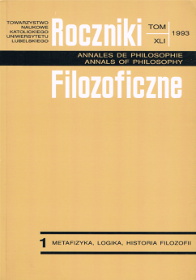Koncepcja „filozofii chrześcijańskiej” w pismach polskich pijarów w okresie Oświecenia. Uwagi metodologiczno-historyczne
Abstrakt
The paper analyses the changes which underwent within the nature and function of philosophy connected with Christian theology in the time of antireligious contestation of the Enlightenment. The problem has been presented on the basis of the didactic of the Polish Piarist schools (S. Konarski, A. Wiśniewski, K. Narbutt, S. Chróścikowski). The didactic is shown against the background of the West-European approaches (Ch. Wolff, E. Pourchot /Purchotius/, E. Corsini, A. Genuensis /Genovesi/) and on the works of the Polish Jesuits (B. Dobszewicz, S. Szadurski). The changes in the philosophy instruction were revealed by emphasizing the problem of the philosophy of life from the scope of the philosophy of God (e.g. the defence of the attribute of Divine Providence which was questioned by deism), anthropology (e.g. the justification of the immortality of the human soul) or ethics (the Christian interpretation of natural law). These approaches did not confine themselves merely to the defence of the traditional doctrina christiana, but while assimilating the results of modern epistemology (R. Descartes, J. Locke), they justified the reason why the revelation should be used as the indispensable element which supplements natural cognition (it is sensible to believe). They were opened to the contemporary currents and that is why they had to take up polemics with the circles which inseparably joined bound theology with traditional philosophy. In consequence they defended the autonomy of philosophy limited only by the negative norm of faith.
The above solutions written in the context of the Polish cultural transformations prior to the setting up of the Committee of National Education constitute an aspect of the European movement described as "Christian Enlightenment".
Copyright (c) 1993 Roczniki Filozoficzne

Utwór dostępny jest na licencji Creative Commons Uznanie autorstwa – Użycie niekomercyjne – Bez utworów zależnych 4.0 Międzynarodowe.





